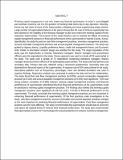| dc.description.abstract | Working capital management is not only improving financial performance in today’s cash-strapped and uncertain economy, but it is the question of meeting retail stores day to day operation. Recently, Kenya has had cases of some of the Supermarkets collapsing and some experiencing empty shelves. Large number of supermarkets failures in the past in Kenya like the case of Uchumi supermarket has been blamed on the inability of the financial manager to plan and control the working capital of their respective Supermarkets. The purpose of this study therefore was to evaluate the effects of working capital management practices on financial performance of the supermarkets in Nairobi County, Kenya. Specifically, the study focused on cash flow management practices, inventory management practices, account receivable management practices and account payable management practices. The study was guided by Agency theory, Liquidity preference theory, credit risk management theory, and Economic order model. A descriptive research design was adopted for this study. The target population of the study was the Supermarket in Nairobi. Operations managers, finance managers and procurement officers were the respondents in the study. Census approach was used to include all 26 supermarket in the study. The study used a sample of 72 respondents comprising operations managers, finance managers and procurement officers of the participating supermarkets. The study used both primary and secondary data. Primary data was collected using a structured questionnaire. Secondary data was obtained from financial reports of the supermarkets. A response rate of 92% was achieved in the study. Descriptive statistics such as frequencies, percentages, mean and standard deviations was used to organize findings. Regression analysis was conducted to analyze the data and test for relationships. The study found that cash flow management practices (p=0.000), account receivables management practices (p=0.025) and account payables management practices (p=0.004) were significant. There was strong positive correlation (r=0.805) between working capital management practices and financial performance of supermarkets whereby64.9%of the financial performance of the supermarkets could be attributed to working capital management practices. The findings also showed that working capital management practices were significant (F=29.110 (4,67), P=0.00) to financial performance of the supermarkets. The study concluded that working capital management practices are very important in enhancing financial performance of supermarkets. Of the four practices under investigation in the study, cash flow management practices, account receivables and account payables practices emerged as the most important in predicting financial performance of supermarkets. Cash flow management practices was the most affecting. The study recommended that supermarkets should seek to invest the cash above the optimal levels to enhance their financial performance. The study also recommended that supermarkets invest in ICT technologies for reducing lead time to enhance inventory management. | en_US |

